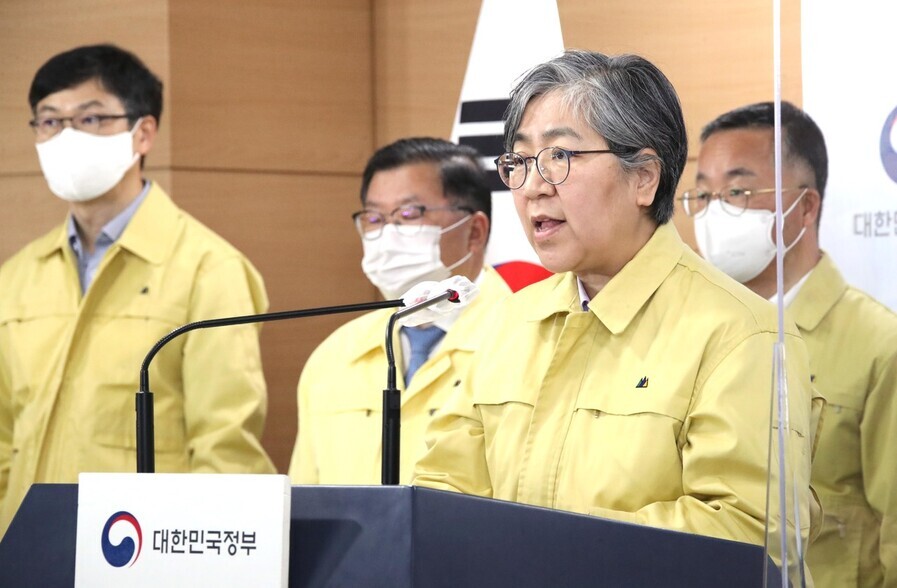hankyoreh
Links to other country sites 다른 나라 사이트 링크
S. Korea to vaccinate 1 million reservists, members of civil defense with vaccines US provided

The COVID-19 vaccines that the US pledged to supply to South Korean troops at a recent South Korea-US summit are to be the single-dose vaccine produced by Janssen.
The vaccines will be enough for one million people or roughly twice the 550,000 that was initially announced. The South Korean government plans to administer them to reservists, civil defense forces, and military-related workers aged 30 and over beginning on June 10.
The Central Disaster and Safety Countermeasure Headquarters (CDSCH) announced Sunday that based on working-level discussions, the amount that the US agreed to provide to the South Korean military on May 21 was finalized at 1,012,800 doses of the Janssen vaccine.
The vaccines are to be supplied on a first-come, first-served reservation basis to 538,000 reservists, 3.04 million civil defense troops, and 137,000 other individuals involved in national defense and foreign affairs who are born before Jan. 1, 1992.
The category of “other individuals involved in national defense and foreign affairs” includes military family members aged 30 to 59, as well as government employees and researchers with the Ministry of Foreign Affairs, Ministry of National Defense, and Military Manpower Administration.
Reservations are to be made through the COVID-19 preventive inoculation reservation system (ncvr.kdca.go.kr) between Tuesday and 11, with the vaccinations to be administered by hospitals, clinics and other commissioned healthcare institutions between June 10 and 20.
Also, because the Janssen vaccine only needs to be administered once, a portion is to be provided to people who urgently need to travel overseas for essential business or important economic activities. The South Korean government counts a recipient as fully vaccinated once two weeks have passed after they received their first dose of the Janssen vaccine.
The selection of vaccine recipients was based on the fact that vaccinations have already taken place for 117,000 soldiers aged 30 and older, with plans in place to administer the Pfizer vaccine during June to the 414,000 soldiers aged under 30.
In clinical trials, the Janssen vaccine’s prevention rate was reported at 66%. A recent study by Health Canada showed prevention rates of 64% against the South African variant of the COVID-19 virus and 68.1% against the Brazilian variant.
Like the vaccine produced by AstraZeneca, the Janssen vaccine is a virus vector vaccine, and a South Korean expert advisory committee and preventive inoculation expert committee have recommended that it only be used for people aged 30 or older due to the possibility of side effects such as rare thrombosis accompanied by reduced platelets.
But in the US, it has been administered without any age restrictions since April 23.
“If the US’s aim was to supply [the vaccine] to troops, it would have been better for them to provide the Pfizer or Moderna vaccines, which could be administered to currently serving troops under the age of 30, so that’s disappointing,” said Jung Ki-suck, a Hallym University professor of respiratory medicine who previously headed the Korea Centers for Disease Control and Prevention (now the Korea Disease Control and Prevention Agency).
“It would have been better to administer the Janssen vaccine first to those in need of a one-and-done inoculation, such as unregistered migrants, homeless people, residents of remote areas, and crew members on deep-sea fishing vessels, but it appears that it could not be done that way because of the aim behind its provision,” he added.
By Kim Ji-hoon, staff reporter
Please direct comments or questions to [english@hani.co.kr]

Editorial・opinion
![[Column] Season 2 of special prosecutor probe may be coming to Korea soon [Column] Season 2 of special prosecutor probe may be coming to Korea soon](https://flexible.img.hani.co.kr/flexible/normal/500/300/imgdb/original/2024/0426/3317141030699447.jpg) [Column] Season 2 of special prosecutor probe may be coming to Korea soon
[Column] Season 2 of special prosecutor probe may be coming to Korea soon![[Column] Park Geun-hye déjà vu in Yoon Suk-yeol [Column] Park Geun-hye déjà vu in Yoon Suk-yeol](https://flexible.img.hani.co.kr/flexible/normal/500/300/imgdb/original/2024/0424/651713945113788.jpg) [Column] Park Geun-hye déjà vu in Yoon Suk-yeol
[Column] Park Geun-hye déjà vu in Yoon Suk-yeol- [Editorial] New weight of N. Korea’s nuclear threats makes dialogue all the more urgent
- [Guest essay] The real reason Korea’s new right wants to dub Rhee a founding father
- [Column] ‘Choson’: Is it time we start referring to N. Korea in its own terms?
- [Editorial] Japan’s rewriting of history with Korea has gone too far
- [Column] The president’s questionable capacity for dialogue
- [Column] Are chaebol firms just pizza pies for families to divvy up as they please?
- [Column] Has Korea, too, crossed the Rubicon on China?
- [Correspondent’s column] In Japan’s alliance with US, echoes of its past alliances with UK
Most viewed articles
- 1AI is catching up with humans at a ‘shocking’ rate
- 2‘We must say no’: Seoul defense chief on Korean, USFK involvement in hypothetical Taiwan crisis
- 3[Column] Season 2 of special prosecutor probe may be coming to Korea soon
- 4Is Japan about to snatch control of Line messenger from Korea’s Naver?
- 5Korea sees more deaths than births for 52nd consecutive month in February
- 6Amnesty notes ‘erosion’ of freedom of expression in Korea in annual human rights report
- 7[Editorial] Korea’s surprise Q1 growth requires objective assessment, not blind fanfare
- 8Is N. Korea threatening to test nukes in response to possible new US-led sanctions body?
- 9Foreign workers live behind daunting language barrier
- 10Park administration’s distorted history textbooks made public